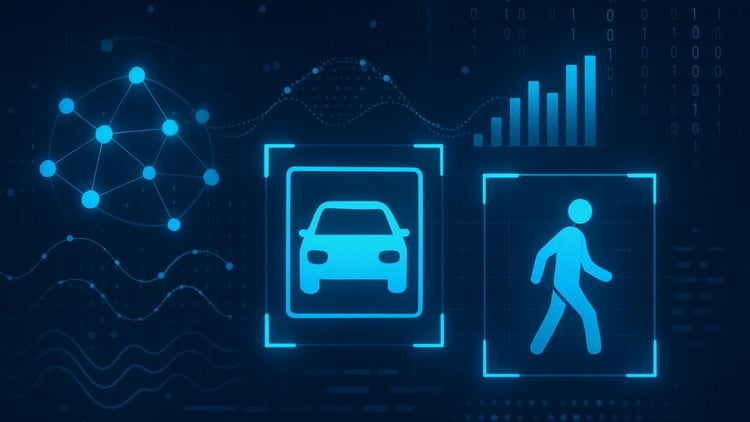
Object Detection | Machine learning | computer vision | Deep learning
⏱️ Length: 2.0 total hours
👥 26 students
Add-On Information:
Note➛ Make sure your 𝐔𝐝𝐞𝐦𝐲 cart has only this course you're going to enroll it now, Remove all other courses from the 𝐔𝐝𝐞𝐦𝐲 cart before Enrolling!
-
Course Overview
- This program, ‘Object Detection From Zero to Hero,’ offers a highly concentrated and transformative journey into the dynamic realm of computer vision. Meticulously designed for rapid skill acquisition, it will guide you from fundamental principles to advanced, practical application of object detection, a cornerstone technology powering autonomous systems, smart surveillance, and medical imaging. You will navigate a structured learning path that demystifies complex deep learning architectures and empowers you to develop robust visual intelligence solutions. The course emphasizes a streamlined, hands-on approach, ensuring you gain not just theoretical knowledge but also immediately applicable skills to tackle real-world visual perception challenges with confidence and technical prowess.
-
Requirements / Prerequisites
- A solid working knowledge of Python programming, including familiarity with data structures, control flow, functions, and object-oriented concepts, is essential.
- A fundamental grasp of machine learning principles, such as supervised learning, model training, validation strategies, and basic performance metrics, will significantly enhance your learning experience.
- While prior extensive experience in deep learning or computer vision is not strictly mandatory due to the course’s “Zero to Hero” methodology, an eager mindset for problem-solving and an analytical approach to complex algorithms are highly beneficial.
- Access to a reliable computing environment with GPU acceleration (e.g., Google Colab, Kaggle Kernels, or a personal setup) is strongly recommended to efficiently run the deep learning models and practical exercises.
-
Skills Covered / Tools Used
- Develop expertise in constructing efficient, end-to-end deep learning pipelines specifically for object detection, from raw data input to robust inference.
- Gain proficiency in advanced data preparation techniques, including strategic data augmentation, normalization, and handling diverse annotation formats to build highly robust models.
- Learn to diagnose and mitigate common issues in computer vision models, mastering debugging strategies for deep neural networks.
- Acquire the skill of hyperparameter optimization, understanding how to tune parameters to maximize model accuracy, speed, and performance on specific datasets.
- Understand the architectural nuances of modern deep learning backbones, enabling informed choices for balancing computational cost against detection precision.
- Master evaluation methodologies beyond simple accuracy, focusing on metrics critical to object detection like Intersection over Union (IoU) and Mean Average Precision (mAP).
- Utilize essential Python libraries for data manipulation (e.g., NumPy, Pandas), scientific computing, and visualization (e.g., Matplotlib) to support your CV workflows.
-
Benefits / Outcomes
- You will be equipped to design, implement, and critically evaluate sophisticated object detection solutions for a wide array of real-world applications.
- Confidently undertake and contribute to complex computer vision projects, possessing the practical skills to move from theoretical understanding to functional deployment.
- Enhance your career prospects in high-demand fields such as autonomous systems, robotics, security, and medical imaging by demonstrating tangible deep learning capabilities.
- Cultivate a strong foundational understanding that facilitates further specialization in advanced computer vision topics, including instance segmentation or object tracking.
- Gain the ability to effectively interpret model behavior and performance metrics, enabling continuous improvement and adaptation of object detection systems.
- Become proficient in rapidly prototyping and iterating on object detection models, significantly reducing development time for new applications.
-
PROS
- Highly practical and hands-on curriculum: Emphasizes immediate application and skill development.
- Efficient learning curve: Streamlined approach enables rapid progress from foundational concepts to advanced implementation.
- Project-ready skills: Equips learners to build and evaluate functional object detection systems.
- Concise and focused: Delivers maximum impact within a short, manageable timeframe.
- Future-proof foundation: Provides transferable skills applicable across various deep learning frameworks and tasks.
-
CONS
- Limited theoretical depth: The concise duration of the course (2.0 hours) inherently restricts extensive exploration of the intricate mathematical and theoretical underpinnings of every algorithm and neural network architecture.
Learning Tracks: English,IT & Software,Other IT & Software
Found It Free? Share It Fast!